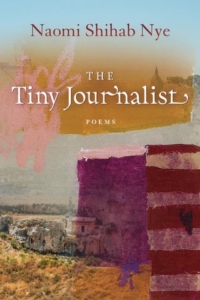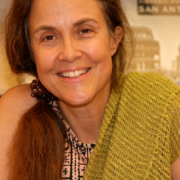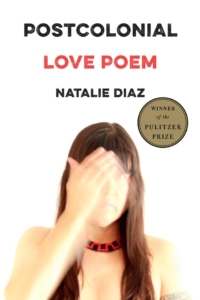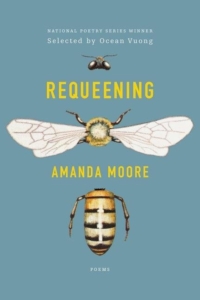Naomi Shihab Nye, The Tiny Journalist
THE TINY JOURNALIST: POEMS, Naomi Shihab Nye. BOA Editions, Ltd., 250 North Goodman Street, Suite 306,  Rochester, NY 14607, 2019, 124 pages, $17 paper, www.boaeditions.org.
Rochester, NY 14607, 2019, 124 pages, $17 paper, www.boaeditions.org.
Naomi Shihab Nye is Palestinian-American and her father was a journalist all his life. The tiny journalist is a Facebook writer named Janna, a Palestinian girl who has been posting videos since the age of seven. The dedications, author’s note, and epigraphs in this book are an education on Israeli/Palestinian relations, Apartheid, and Palestinian suffering.
It Was or It Wasn’t
Arabic fairy tales begin this way,
so do Arabic days.
A pantry is empty
but Mama still produces a tray of tea and cookies
for the guest.
West is the still the way we stare—
knowing there’s blue space and free water
over there. There’s a Palestinian and a Jew
building a synagogue together in Arkansas.
They’re friends, with respect.
Actually our water
isn’t free either
nor are the fish my friends in Gaza
aren’t allowed to catch.
It was or it wasn’t a democracy,
a haven
for human beings,
but only some of them.
You can’t do that with people,
pretend they aren’t there.
It was or it wasn’t a crowd.
Diploma, marriage, legacy,
babies being born,
children being killed,
it was or it wasn’t going to work out.
These are not sophisticated, craft-conscious poems. They are like a voice, whispering in your ear. “If you live like a real human being— / that is the issue. Not winning and hunting others. / Not dominating. / Not sending their sewage their direction. / Did you know? Did you know they do this?” (from “Losing as Its Own Flower).
Advice
My friend, dying, said do the hard thing first.
Always do the hard thing and you will have a better day.
The second thing will seem less hard.She didn’t tell me what to do when everything seems hard.
Rather than look for reviews to quote, or try to describe this collection, I would love to give you enough to reveal the many facets here. Probably not possible.
Grandfathers Say
Grandfathers say the garden is deep,
old roots twisted beyond our worry
or reach. Maybe our grief began there,
in the long history of human suffering,
where rain goes when it soaks out of sight.
Savory smoke from ancient fires
still lingers. At night you can smell it
in the stones of the walls.
When you awaken, voices
from inside your pillow
still holding you close.
The book ends with a short poem, “Tiny Journalist Blues”; the last lines, “Nothing big enough / but freedom.” Amen.
Read more and find additional links at https://www.boaeditions.org/products/the-tiny-journalist.



 2020, 105 pages, $16.00 paper,
2020, 105 pages, $16.00 paper, 
 Beekeeping with its queen is the metaphor binding the book together as the poems chronicle motherhood, the eventual disrupting flight of a daughter, the death of a parent. Teaching The Odyssey to high-schoolers. Cancer. Death. All housekeeping, finally. Always disequilibrium.
Beekeeping with its queen is the metaphor binding the book together as the poems chronicle motherhood, the eventual disrupting flight of a daughter, the death of a parent. Teaching The Odyssey to high-schoolers. Cancer. Death. All housekeeping, finally. Always disequilibrium.
